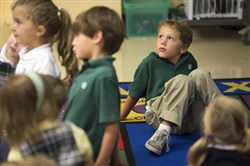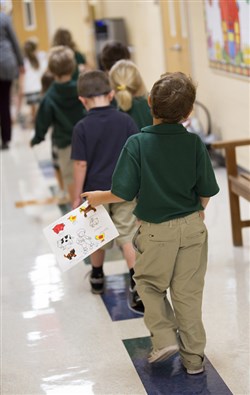VOL. 39 | NO. 41 | Friday, October 9, 2015
Redshirting: Waiting an extra year to start kindergarten has its risks
By Hollie Deese
Mary-Michael and Joe Horowitz know their son Armour, 5, can handle the academics of kindergarten. But instead of pushing him through to meet state age cutoff standards, they decided to delay his start until next year when he is older and emotionally ready.
He is currently enrolled in preschool at Oak Hill School instead.
“We knew Oak Hill was probably the school we wanted him to go to in kindergarten,” says Mary-Michael. “Being in a situation where we could send him to pre-K at a school where he may go to kindergarten, it is almost like he can dip his toe in the water.”
Delaying a child’s start at the pre-K or kindergarten level, known as academic redshirting, is on the rise as parents grapple with ever-earlier kindergarten cutoff start dates that force them to decide whether they want their children to be among the oldest in their class, or the youngest.
“Overall the national trend has been that the average kindergarten age has increased over the last 35-40 years,” says Bruce Atchison, executive director of policy and operations/director of early learning for the Education Commission of the States.
Atchison says in 1975 only eight or nine states required children be age 5 before they entered kindergarten. Now it is closer to 40.
“And then, of course, that entry month varies widely across the states, as well, whether it is the end of August or the end of September or whatever, which is huge for the parent,” he says.
In 2013, a new state law bumped the entry age for kindergartners in Tennessee up one month, changing the birthday cutoff from the end of September to August 31.
“Kids grow so much in a year, especially at that age, and they talk about the leadership qualities when you do have emotional intelligence, and what great leaders they make,” Mary-Michael explains.
Gaps close over time

Armour Horowitz, 5 in his pre-school class at Oak Hill School. Armour’s parents choose to have him start school a year later.
-- Michelle Morrow | The LedgerAtchison says there isn’t much research about the academic or social effects of a delayed start, good or bad, but any advantage a child gains in the first few years of school by being a bit older is made up by everyone else before middle school.
“Development is a continuum,” he says. “Unless there are developmental delays or serious abuse, neglect, family issues or other factors, but if the child is being raised in a loving, caring supportive environment, whether it is the biological parents or grandparents or otherwise, low income or upper income, those kids are going to do fine if they start kindergarten at a younger age or at an older age.”
Plus, he doesn’t want parents to discount how much is learned before school even starts, with early brain research showing children retain the most information from birth to age 3.
Ricky Perry, president of Goodpasture Christian School in Madison, has never had children of his own but says a delayed start has helped many students entering the school, and even his own nephews.
“Every child is different and you have to look at their maturation and their level of ability,” Perry points out.
“I see over and over again, when a child gets to do things when they are a little older, on average they tend to do much better just with their whole maturity, physically and cognitively.
“In the case of my nephews, they waited to start them in either pre-K or kindergarten later. They are all now in their 20s and 30s and are grateful to have had the opportunity to mature another year.”
While it can be a benefit for a child’s social interaction, Atchison says the pressure is on teachers to get all children reading proficiently by third grade, which is one reason the academic gaps close. As teachers cater to catch kids up, older kids take a back seat.
“Whether a child enters kindergarten as a young 5-year-old or older 5-year-old or young 6-year-old, a vast majority of those kids are all going to be reading by third grade,” he says.

Mary-Michael Horowitz says holding their son Armour (right) back a year before kindergarten gives him a better chance of “being a thriving member of society.”
-- Michelle Morrow | The LedgerStill, Armour’s mother remembers what it was like to be among the youngest students in her class, all the way through high school, and hopes to help her own child avoid some of those issues.
“None of it had to do with us thinking academically, he wasn’t ready,” she says of delaying his start.
“It had more to do with emotional intelligence and social intelligence. I was one of the youngest people in my class growing up, and I feel like I was behind in those areas as well.”
Perry explains parents can struggle with the decision to delay a child and admits it is a tough call, especially if it happened well into the school career. Doing it before the start of kindergarten eliminates some of those problems.
“If they have been with their peers through elementary school, then it becomes more of the child being aware of not going on with their friends, and that becomes a real deterrent to parents being willing to hold their child back at that time even though they think it is best,” he says.
“I think parents are doing a really good job of deliberating.”
Redshirting for athletics
Bernard Childress, executive director of the Tennessee Secondary School Association, says holding kids back in order to get an athletic advantage is against the rules, and has been for years.
“Our bylaw states if any student repeats seventh or eighth grade and participated in school athletics during the year they repeat, then they are ineligible their ninth grade year, and ineligible in every sport at all levels,” he says.
“That was put in place to prevent redshirting for athletic purposes. We had schools we were hearing about where entire teams were being held back and playing an extra year.”

Armour Horowitz follows his fellow Oak Hill School kindergarten classmates through the school’s hallways.
-- Michelle Morrow | The LedgerBut these rules only apply to Tennessee schools that are part of the Tennessee Middle School Athletic Association – about 350 of more than 700 schools statewide.
“In non-member schools, we have no jurisdiction over what they do,” he explains.
“We get it all the time where coaches will call, and we just tell them not to play them [non-member schools]. They make their own regular season schedules.”
In addition, Childress says something parents might not think about when they are holding children back at any age for any reason: If a student turns 19 on or before August 1, they are automatically ineligible to participate in high school athletics – no exceptions.
“We can’t grant an exception regardless of what their situation was,” he says. “If they are 19 or have been in school for eight semesters, those are two rules that have never had exceptions made in the history of the organization.”
Startling Vanderbilt study
The importance of a pre-K education itself is currently under the microscope after a five-year study on Tennessee’s volunteer pre-K program, by Vanderbilt’s Peabody College, was recently released.
The study followed 1,000 students from pre-K through third grade and compared them to a group that skipped pre-K. The results were shocking.
Not only did students who missed pre-K catch up within a year or two, but the students who attended pre-K fell behind their peers by the time they finished third grade.
However, Atchison says this could have a lot to do with the transition from pre-K to kindergarten.
“You can have the highest quality pre-K program – full day, full year, good ratios, highly qualified teachers, parent conferences, good curriculum, so forth and so on – but if that child goes from that situation into a less than high quality kindergarten or elementary school, you are going to have some fade out that begins to occur,” he explains.
An ideal situation he says would be to choose a high-quality pre-K program that is part of a larger school system. Or better yet, improve the quality of kindergarten through third grade nationwide.
“It is certainly an area that needs a lot of attention, and we have a lot of work to do in this county in my opinion to narrow that gap,” he says.
“There is so much pressure these days on parents – and kindergarten teachers – that preschool is the new kindergarten and kindergarten is the new first grade.
“And with large class sizes and a significant numbers of kids coming into the school without maybe any pre-K experience, that is where that teacher’s energy has to go.”
Cost a concern
The National Bureau of Economic Research said in 2008 that the stagnation in the high school and college completion rates across the country is partly explained by a later start in primary school.
The NEBR points to the later start in primary school among boys in particular as an explanation for a small rise in the gender gap in high school graduation and college completion.
And lower-income children are at greater risk of dropping out of school when they reach the legal age of school exit, which happens sooner when they start later.
“Oftentimes, redshirting is more of an issue for middle- and upper-income families who have that choice,” Atchison says.
“Children living in poverty are entering kindergarten and don’t know how to hold a pencil yet. They can’t follow a simple three-step instruction, they can’t tell you what a favorite book is because they haven’t been exposed. It is not their fault and it might not be the fault of the parent if they have three kids and are single and have to work two or three jobs.
“Our society needs to continue to address that issue, which I think is very much a struggle for the public schools.”
All teens get antsy during those last few months of senior year, even more so when they are among the oldest in the class. But it’s still worth it as they move on to college, he says, with 19-year-olds possibly taking a more mature approach to studying and living alone than a 17-year-old might.
“The tradeoff of those last few months before going to college is how many things they were able to handle in a more mature way all throughout their school careers,” he adds. “It is a pretty good trade off to let them have a little bit more maturity. In the long run, it gives them more confidence.”
Ultimately a family decision
The Horowitzes are sure they made the best choice for their son, especially as he thrives in his pre-K program, not only with academics but handling new relationships with his peers.
“We have never talked with anyone who said they regret doing it,” Mary-Michael Horowitz says.
“I have talked to people who didn’t hold their child back who then wished they had. And that was a big reason with our thought process.
“Everything you do as a parent is just a crapshoot, and we are just trying to give him the best shot at being a thriving member of society. And I think that for us, it just seemed like the right thing to do.”
Atchison agrees it should be the parent’s choice and one they will continue to struggle with.
“It’s an issue that is not going to go away,” Atchison says.
“As long as there are cutoff dates and parents grapple with this, we are going to continue to see redshirting, parents making the decision to hold kids back.
“And until we put a little more research into this about what exactly the implications are for the child and later learning, it is going to continue to happen.
“Right now there is no simple right or wrong answer.”